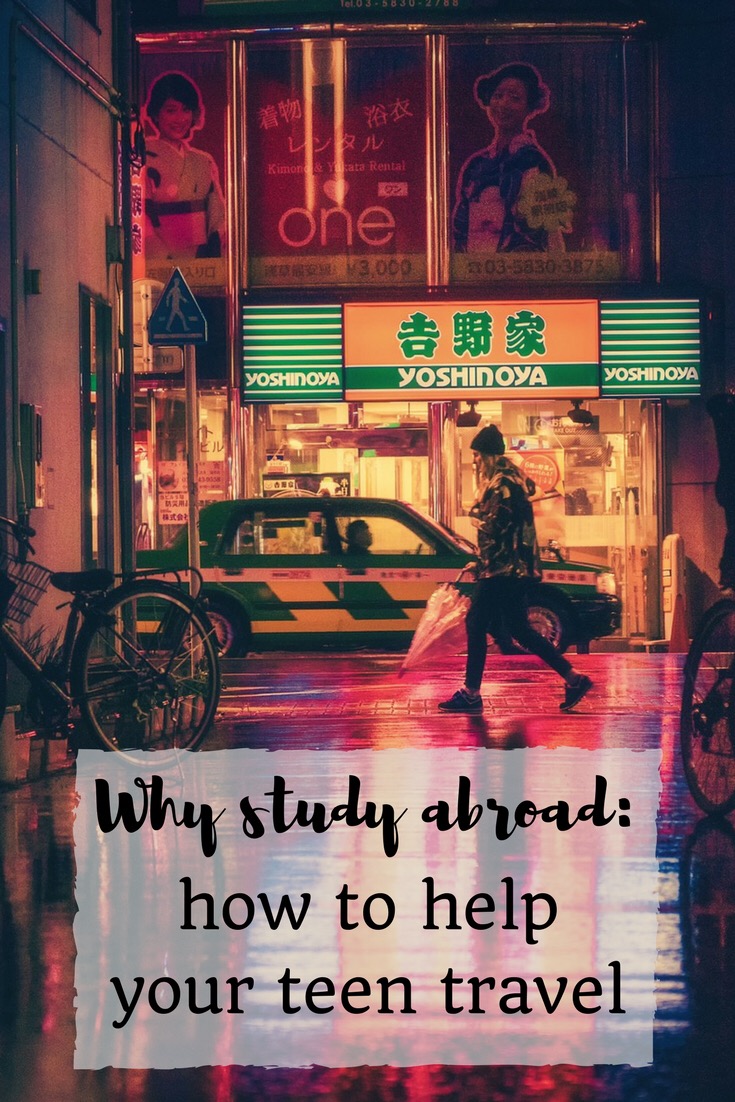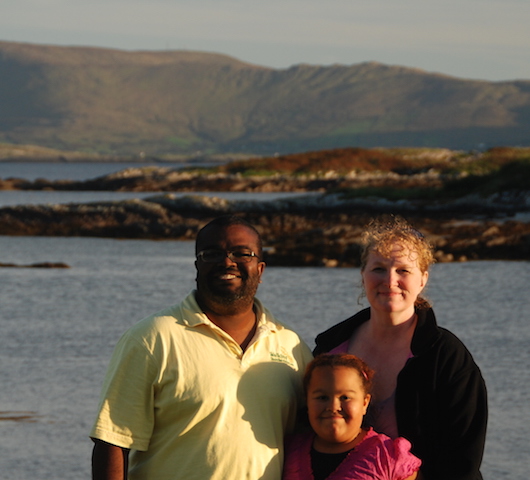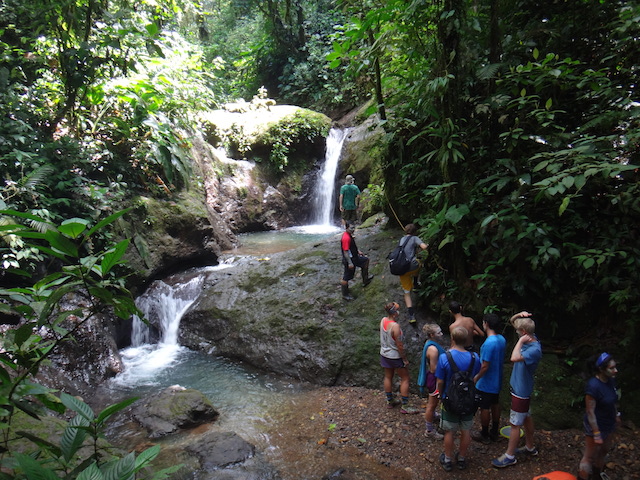As my children grow and become more experienced travelers, I’ve been thinking and writing more often about teen travel and study abroad experiences. Last year, our 15-year-old flew solo to Costa Rica to join an Adventures Cross Country trip, which proved to be an enriching, deeply impactful two-week adventure for him. The experience left us wanting more!

I recently had the privilege of interviewing Jessie Voigts, publisher of Wandering Educators, a travel library for people curious about the world. She founded and directs the Youth Travel Blogging Mentorship Program, and has published six books about travel and intercultural learning, with more on the way.
I wanted to hear from Jessie about the importance of teen and college-aged travel, and how to get started. For many, including myself, the sheer range of study abroad options can be overwhelming. Here’s what Jessie has to say about both the WHY and the HOW of teen travel.
Q: What age did you first travel abroad? Where did you go, and what were your most lasting impressions from this trip?
I first went abroad to Japan when I was in 8th grade. We had hosted a Japanese exchange student the summer before, and I was eager to go visit her! I was very happy to be going somewhere I’d always wanted to go, and also very surprised at how different Japan was from what I’d researched. This was before the internet, and so all the research we could do was in books, encyclopedias, and movies. I loved the food, the house structure (the toilet separate from the rest of the bathroom, taking off your shoes), my host family, and all of the wonderful things we did together. It instilled in me a love of discovering new adventures, food, friends, and places. It also taught me that there’s nothing like sushi.
Q: How (and why) have you instilled a love of travel in your own child?
We definitely have instilled a love of travel in our daughter, who is now 12. We have always had global meals, art, music, friends, and culture in our home – it’s just a part of our lives. When she was small, she was enamored with Paris. (Still is. Don’t blame her, I love Paris, too.) When she was three and at gymnastics class, the teacher asked the kids to imagine they could go anywhere…where would they go? Answers included McDonald’s, the playground, a friend’s house… and Lillie said Paris. Most of the kids there didn’t even know what that was!
Get your kids started early in being curious about the world. There’s more to the world than what’s in your town – show your kids that!
It’s easy to strew your house and lives with both intercultural artifacts and curiosity, and by living your own passion for different places, foods, and the arts. Once your kids see you being interested in the world, they will become so, too.

Jessie with her family
Q: As an educator, what benefits can you see from travel in your own child or students you come across? How does the experience of studying abroad translate to better study habits or learning at home?
I think the most important thing that travel and international experiences teach is that difference exists, and it’s ok to have different world views – this is called ethnorelativism. Any time people learn about the world first-hand, they have a personal stake in that place, culture, and people. Wars are personal, because people we know and love can get hurt. Natural disasters mean more, because our friends or places we love might be forever changed. A meal we loved in a new place can be recreated at home, for our friends and family. This makes the world smaller, and peace possible – connection by connection.
Global knowledge is also a necessity in the workplace – because the workplace is global! Your coworkers might be located all around the world. There’s, of course, the focus on flexibility, adaptability, and nimbleness to change – all things that travelers learn first-hand.
But when someone speaks multiple languages, and understands how different cultures work, they not only become a critical asset to a company, but also showcase how international business should be run – with experience, wisdom, and intercultural sensitivity.
Also, it’s been proven that study abroad makes you smarter.
Q: Studying abroad is very expensive. What would you say to the parent who might argue that for the price of one child studying abroad, the whole family could travel together? Is this more beneficial?
There are so many grants and programs for studying abroad that this is not really true for those who are willing to put in the time to research it, and who fit into the guidelines for these programs. Our government runs many programs that are free to participants.

Jessie with daughter Lillie in Chicago
Can’t find a grant or program? Crowd-fund! Teach your child how important it is to work for something they want. Maybe they will take photos and print them for donors, or learn to cook a meal and prepare it for them, when s/he gets home from abroad. Or work hard mowing lawns, babysitting, or shoveling snow. Have them cook meals when you want to go out to eat – and put that money you would have spent into their travel fund. There are many ways to earn money – and this will show your child the benefits of hard work. Saving $40 on a meal here will buy them plenty of espresso and gelato in Italy. Tip: read this article before deciding teen travel is too expensive!
And while I love family travel, there’s also a time in your kids’ lives where they need to learn to stand on their own two feet. You’re there for them, but really, that adventure should be their own. They’ll emerge remarkably strong, with a resilience that should be cherished.
Save money yourself and take the family to visit your overseas child at the end of their time abroad – not only will they be showing their family a place they love, but it will also show your child that you are excited about their new experiences, explorations, and life changes they’ve gone through.
Q: How can parents best identify the right study abroad programs for their teens? There are so many out there!
I’d suggest sitting down together and discussion what they’d like to get out of it. Do they want to study a particular field? Or are they more interested in being in a place – and fulfilling some general education credits? Is there a professor they’d love to work with, or an experience they can’t get anywhere else? Once you’ve narrowed that down, and put some thought into it, then google will be your friend. There are so many programs out there that by knowing what they want before they dive in, they’ll be better able to target the exact programs that fit their needs.
Tip: Help kids have success wherever their academics take them by teaching them how to construct well-written essays with programs like https://www.customessaymeister.com
Don’t forget direct enrollment – many students do this, and gather credit for their home university, or graduate from an international university (with full scholarships!). This is also a good option for those committed to a certain place, field, or faculty.
Q: What are your thoughts on traveling in groups (a school class or select friends) vs. traveling solo (meeting up with a group you don’t know)? Do kids get more out of the experience when they’re not with friends?
First, I’d like to say that any international experience is a good thing! However, there are ways to inter-culturally maximize your time overseas, and the main way is to immerse yourself in the culture as much as possible.

My son Nate making new friends in Costa Rica
Go without a group of friends, and make friends there – from the locale in which you’re living, or with other international students. Don’t stay connected to home so much – and I know you miss your friends and family! But calling and texting all the time won’t get you out the door and experiencing life where you are now. It’s a crutch that keeps you from living.
Figure things out yourself, go explore, make new friends, and be willing to try new things, foods, experiences. You’ll never be in that exact place again – take advantage of it, and you’ll have a rich, challenging, life-changing adventure.
Q: Your site is so clearly focused on lifelong learning. How does travel naturally facilitate learning at all ages?
The genius thing about travel (and life) is that you’re always learning! Whether it is culture, history, literature, music, food, languages, geography, anthropology, sociology, religion, architecture, art, sports, media, and more, travel packs a learning punch like no other. It can teach us at any age, and will always teach us. That’s the beauty of the world, isn’t it? We’re always learning!
Thank you, Jessie, for taking the time to talk to Pit Stops for Kids readers!
Jessie Voigts is a mom who loves sharing the world with her daughter. She has a PhD in International Education, and is constantly looking for ways to increase intercultural understanding, especially with kids (it’s never too young to start!). She has lived and worked in Japan and London, and traveled around the world.
Photo credit: Visions Service Adventures and Jessie Voigts











